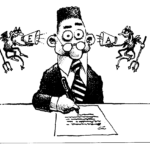WORD WISE
Soundalikes
Words that sound the same but have different definitions
 The two words in each of the pairings below roughly resemble one another, and are pronounced pretty much the same. The problem, though, is that they don’t share the same meaning.
The two words in each of the pairings below roughly resemble one another, and are pronounced pretty much the same. The problem, though, is that they don’t share the same meaning.
ADVERSE VS AVERSE
Both words are adjectives that express negativity—but in different ways. Adverse (never followed by “to”) describes reactions, conditions and responses that are negative or harmful. Averse (always followed by “to”) means to be strongly against or not inclined to do something.
I had an adverse (negative) reaction to the guacamole-raisin ice cream cone I ate last night, but I am not averse (against)) the idea of ordering it again.
Reminder: If you are AVERSE TO verse, you will have an ADVERSE reaction to poetry.
AFFECT VS EFFECT
Affect (with an accent on the second syllable)) is a commonly used verb whose primary definition is to have an impact on something. It can also function, however, as a noun, in which case it refers to the outward expression of a person’s internal emotions——and should be pronounced with an accent on its first letter. Effect can also operate as either a noun or a verb. As a noun, it means the result of something. As a verb, it means to cause or bring about something.
The weather yesterday had a major effect (result) on the morning rush hour.
But: Thanks to your help, we were able to effect (bring about) major improvements in our service.
Reminder: To remember that “effect” is usually a noun, remember the phrase NOW IN [noun} EFFECT)
ITS VS IT’S VS ITS’
Its is the possessive form of “it” and, as such, doesn’t include an apostrophe. It’s is a contraction for “it is”. Its is the possessive form of the pronoun “it”.
The weather has been great for the past few days, but I wonder how long it’s (it is) going stay to this warm.
Reminder: ITS SITS alone as an OWNER.
THERE VS THEIR VS THEY’RE
There is an adverb that means “in a place or position”. Their is the possessive form of “they” and means “the owners of”. They‘re is a contraction for “they are”.
I had a long talk yesterday with Alexander and other members of his team, and I think you will be interested in their ideas.
I will be sending over the new brochures as soon as they‘re (they are) ready.
Reminder:. Associate THERE is WHERE. THEIR belongs to THEM.
TO VS TOO VS TWO
To is a preposition that means “in the direction of”. Too is an adverb that means “also” or “excessively”. Two, of course, is a number.
It is too (excessively) late for me enroll in your program.
Memory key: The extra O in TO means something MORE.
WHOSE VS WHO’S
Whose is the possessive form of the pronoun “who “, and, like all possessive pronouns, can show ownership without the presence of an apostrophe. Who’s is a contraction for “who is” or “who has”.
Memory key: WHOSE HOSE is in my garden.